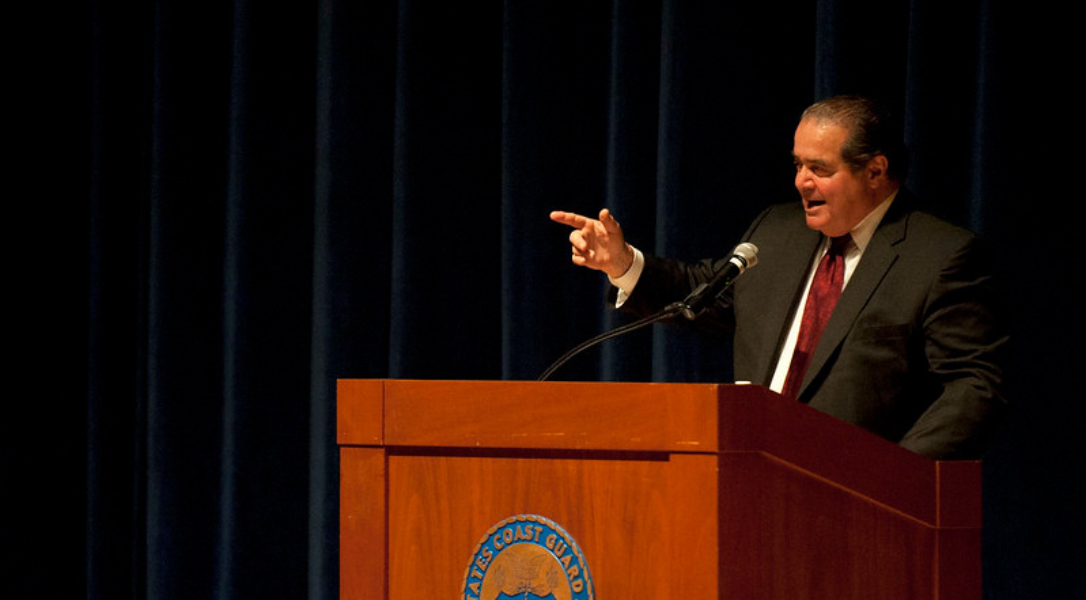The Supreme Court of the United States is the highest court in the land.
President Ronald Reagan appointed four Justices to the Supreme Court, including the first woman, Sandra Day O’Connor.
But this Reagan appointee was one of the most important and influential Justices in the history of the Supreme Court.
Antonin Gregory Scalia
Scalia, the son of devout Catholic Italian immigrants, was born on March 11, 1936, in Trenton, New Jersey.
He attended George Washington, graduating in 1957, and went on to obtain his law degree from Harvard in 1960.
After graduating, Scalia joined a law firm in Cleveland, where he remained for six years, until relocating to Charlottesville, VA, in 1967, where he took a job at the University of Virginia as a law professor.
Beginnings of Public Service
In 1971, Scalia gave up teaching and first entered the realms of public service when he was appointed by Richard Nixon as the general counsel at the Office of Telecommunications.
In 1974, Nixon nominated Scalia for the position of Assistant Attorney General with the Department of Justice, but along came Watergate, and actions put forth by the 37th president were put on hold.
After Nixon’s resignation, Gerald Ford championed Scalia’s nomination, and he was approved by Congress in August 1974.
Scalia lost his position when Democrat Jimmy Carter was elected, and he returned to teaching law, this time at the University of Chicago.
Becoming a Supreme Court Justice
With the election of Ronald Reagan in 1981, Scalia sought to return to Washington, D.C.
In 1982, he was appointed to the U.S. Court of Appeals.
Reagan admired his strict approach to the Constitution and his strong conservative values.
In 1986, Reagan was given the opportunity to fill the Chief Justice position, and he nominated William Rehnquist for the position. Rehnquist was approved, and now, his associate Justice seat needed to be filled.
Reagan nominated Antonin Scalia for the vacated seat.
He was confirmed by the Senate Judiciary Committee with a 98-0 vote on September 17, making him the first Italian American Supreme Court Justice.
In his position as a Supreme Court Justice, Scalia was a staunch proponent of the Constitution as written, a stance that became known as “Textualism.”
Textualism is “legal interpretation,” citing the base meaning of a legal document as it was written. Scalia felt that this certainly applied to the U.S. Constitution, and he used it throughout his career as a Supreme Court Justice.
He felt that the basis of U.S. constitutional law was the texts themselves and not on later interpretations that were not based on the written text.
He also embraced “originalism” when it came to settling matters pertaining to the Constitution. William Baude said after his death that Scalia believed that “the idea that originalism was centrally a way, the best way, to constrain judicial decision-making, whereas non-originalist theories would essentially license judges to make up constitutional law as they went along.”
These were the two effective tools that Scalia used when matters of Constitutional law were brought before the Court.
Michael McConnell, a professor of Constitutional law at Stanford, said, “Antonin Scalia was the most significant and influential Supreme Court Justice of the last 30 years . . . By sheer force of intellect and personality, Scalia helped to move the court from a somewhat sloppy, results-oriented, center-left institution to a more intellectually rigorous center-right court that forefronts text and history over other modes of interpretation. In the course of this, he (along with a handful of other judges and academics) gave birth to the modern conservative legal movement.”
Enduring Legacy
Like him or not, no one can deny that Antonin Scalia was a staunch defender of the U.S. Constitution and changed the way many people viewed the Supreme Court. He was an advocate for state’s rights. He opposed abortion, and he was a strong proponent of the Second Amendment.
He was so successful at defending the U.S. Constitution that when Joe Biden was Vice President, he said that he regretted “that he had not opposed Scalia’s nomination because he was so effective.”
Antonin Scalia died unexpectedly in Marfa, Texas, on February 13, 2016, at the age of 79. His career as a Supreme Court Justice lasted through five presidential administrations.
After his death, McConnell noted that, “He was beloved by his friends, and not infrequently by his adversaries.”
Are you enjoying 24/7’s deep dives into recent and not-so-recent history? Would you like to see more stories like this one? If so, reply back to [email protected] and let our Editorial Team hear from you!
For now, keep an eye on your inboxes Thursdays and Saturdays for new editions of “Today in History” from the 24/7 team!
Also, be sure to sign up for 24/7’s Exclusive “Choose the News” Focus Group for your chance to vote on and submit commentary in our Featured Story each week!










